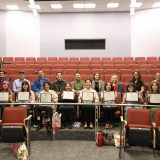Attention: Chapman Graduate Students! The Graduate Writing Assistant Program was Created with Your Specific Needs in Mind!
December 9, 2019
![]() By Elena Goodenberger
By Elena Goodenberger
MFA Graduate Student
Who do you go to for feedback when you are working on a paper or creative project?
Your professor? Your mom? Your classmate? Your cat?
All graduate students can benefit from someone to bounce ideas off of—someone to ask, “Does this sentence make sense?” or “What if I wrote it this way instead?”
The Writing Center here at Chapman recently expanded its services for graduate students in order to facilitate this kind of creative collaboration among graduate students and to help students find success in their writing life. The tutors at the Writing Center are our writing coaches, and what athlete ever outgrows coaching?
I sat down with Dr. Sarah Robblee, Director of the Chapman Writing Center, to talk about the exciting new Graduate Writing Assistant (GWA) program.
Elena Goodenberger: What led to the decision to start the Graduate Writing Assistant program?
Sarah Robblee: The Graduate Writing Assistant (GWA) program grew out of concerns voiced by faculty members in various programs about the need for writing support for their graduate students. Dr. Roxanne Greitz Miller, Vice Provost for Graduate Education, was attentive to this need and initiated partnering with the English Department and the Writing Center to support graduate students in this way. Some of our graduate students already visited the Writing Center for writing support. However, we were interested in extending the Writing Center support with extra training for GWAs in thesis and dissertation writing, style guides, library research support, common ESL concerns, literature review writing, and other graduate-level writing needs.
Goodenberger: I’m a student in the MFA in Creative Writing program, so I think of myself as a good writer already. But I’m thinking that a session with a GWA could be good for any graduate student here at Chapman University. What types of training do the Graduate Writing Assistants receive to support the students they work with?
Robblee: GWAs are trained in issues specific to graduate-level writing. In addition to a Saturday morning workshop, they complete a five-week training via a set of study modules on topics such as common style guide practices, thesis and dissertation writing guidelines specific to Chapman graduate programs, ESL writing concerns, assisting students in moving from one point to the next in their research process, and differences between scholarly and creative writing.
Goodenberger: These writing tasks, especially the thesis and dissertation, are ones that all graduate students face. I’m also glad to hear about the attention to those of us whose first language isn’t English, because that supports Chapman’s approach to global citizenship. As a graduate student myself, how exactly can I connect with a GWA to get help on a writing project?
Robblee: GWAs are available at both the Rinker and Orange campuses during the week and on Saturdays during the semester. Their specific hours vary semester to semester, so look for their hours available on Chapman’s GWA webpage of the Writing Center website.
The Rinker GWAs are located at a table in the Student Commons (Building 9401). The Orange GWAs are located in the Writing Center in DeMille Hall, with the exception of Saturdays, when a GWA is located on the patio of Starbucks or attending an Oasis event. Oasis events are an excellent way to get focused time with a GWA as well as a time and atmosphere set apart for workshop writing.
Goodenberger: I saw on the website that Oasis events are longer blocks of time—with beverages and snacks provided—for up to 20 graduate students to write and revise together with a GWA there to answer questions or offer guidance. That’s a terrific idea. But what if my schedule is jam-packed and deadline is approaching and I need help?
The GWAs also offer digital tutoring! You can email them your written work, along with information specified on the GWA webpage, to graduatetutor@chapman.edu for feedback. They will do their best to get back to you within 48 hours during the week.
Goodenberger: I’m really interested in this program now. For graduate students who might want to be a GWA next year, what steps should they take now?
Robblee: The GWAships are year-long graduate assistantships, for which I put out a job ad on Chapman’s PeopleAdmin and begin interviewing and hiring in mid-May. We hire two GWAs for the Rinker campus for the summer/fall/spring semesters and two GWAs for the Orange campus for the fall/spring semesters. Students who are well prepared for a GWAship have experience tutoring or teaching, or have taken related coursework.
Goodenberger: What are some of the benefits of this opportunity for the GWAs?
Robblee: The GWAship is a great addition to your skillset and experience not just for a future in professional tutoring or teaching, but it also will help you develop excellent listening, written, communication, and organizational skills that will transfer to other careers you are interested in pursuing. It’s terrific if you want to pursue additional graduate studies too.
The GWAs are supported by the Vice Provost for Graduate Education. If you want to learn more about connecting with a GWA to talk about your writing, or if you’re interested in applying to become a GWA next year, contact Dr. Sarah Robblee at sasmith@chapman.edu!


